Africa · Attractions · Egypt · Going Out · Regions
5 days in Luxor, Egypt
Egypt is a land of many faces, from the beach resort of Sharm El-Sheikh to the bustle of Cairo and the laidback history of Luxor and the latter is certainly worth your time. Tourism is slow at the moment, but in Luxor it is easy to forget the headlines as you explore sites both ancient and modern. There is so much to see, it is best to start early and plan well.
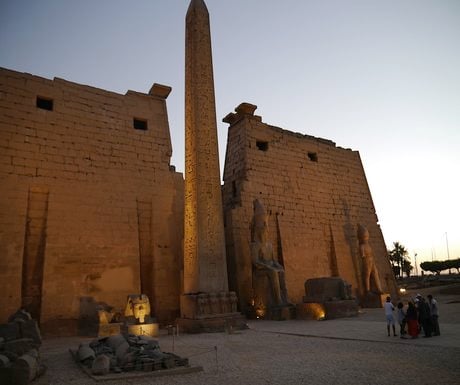 Day 1 – The West Bank Tombs
Head across the Nile to the West Bank, where the majority of the ancient sites are situated. Start early there is little shade here and begin at The Valley of the Kings. The entry fee covers entrance to 3 tombs of your choosing, although if you go with a guide they will often choose the best. The tombs of Seti and Ramesses IX are worth a visit if youre unsure. If you want to skip a tour, do some research in advance; knowing what certain motifs mean makes the experience more worthwhile.
Pay an extra 10egp and head into the tiny tomb of Tutankhamun and see the man himself. Photos arent allowed in the tombs, but if you carry a large tip and enter alone there is nothing the guardians wont let you do.
Finish off as the sun hits its peak by visiting the House of Howard Carter, just outside the valleys entrance. It is quite eerie to wander around the home, left almost exactly as it was in 1922.
Day 2 The Other Tombs
With an early start again, visit the other tombs on the West Bank. The Valley of the Queens is home to the famous tomb of Nefertari, and if it is open this is one not to be missed. Many of these tombs are smaller, but better preserved. Aim to spend an hour or two here.
Day 1 – The West Bank Tombs
Head across the Nile to the West Bank, where the majority of the ancient sites are situated. Start early there is little shade here and begin at The Valley of the Kings. The entry fee covers entrance to 3 tombs of your choosing, although if you go with a guide they will often choose the best. The tombs of Seti and Ramesses IX are worth a visit if youre unsure. If you want to skip a tour, do some research in advance; knowing what certain motifs mean makes the experience more worthwhile.
Pay an extra 10egp and head into the tiny tomb of Tutankhamun and see the man himself. Photos arent allowed in the tombs, but if you carry a large tip and enter alone there is nothing the guardians wont let you do.
Finish off as the sun hits its peak by visiting the House of Howard Carter, just outside the valleys entrance. It is quite eerie to wander around the home, left almost exactly as it was in 1922.
Day 2 The Other Tombs
With an early start again, visit the other tombs on the West Bank. The Valley of the Queens is home to the famous tomb of Nefertari, and if it is open this is one not to be missed. Many of these tombs are smaller, but better preserved. Aim to spend an hour or two here.
 Next, hop over to the Valley of the Nobles if you can handle more tombs. Instead of the usual offerings to the gods, many of these tombs tell the life story of each resident, which offers an interesting glimpse into the daily life of a rich Egyptian.
Day 3 East Bank
Take a break from the West Bank and spend a day exploring the temples of the East Bank. Karnak and Luxor temples were originally joined by a long road named Sphinx Alley which is currently under excavation you can see each end at each temple. Start off at Karnak and aim to spend 1-2 hours here. The site is huge, and there is very little shade outside of the hall of columns.
Next, hop over to the Valley of the Nobles if you can handle more tombs. Instead of the usual offerings to the gods, many of these tombs tell the life story of each resident, which offers an interesting glimpse into the daily life of a rich Egyptian.
Day 3 East Bank
Take a break from the West Bank and spend a day exploring the temples of the East Bank. Karnak and Luxor temples were originally joined by a long road named Sphinx Alley which is currently under excavation you can see each end at each temple. Start off at Karnak and aim to spend 1-2 hours here. The site is huge, and there is very little shade outside of the hall of columns.
 Head to Luxor museum, which is small by city standards but a delight none the less. This is the place to see the spoils of Howard Carters excavation, including Tutankhamuns bed and chariot. There are also two further mummies here, Ahmose I and Ramesses I.
Take a break before venturing to Luxor museum as the sun sets. The lights are quite spectacular and offer wonderful photo opportunities. This temple is much smaller than Karnak, but far better preserved. Tip: head to the back of the temple. It has a great example of Roman art covering Egyptian reliefs!
Day 4 Mortuary Temples
Another day at the West Bank, but this time above ground. Stop off at the Colossi of Memnon and try to spot which statue was rebuilt by the Greeks. Hint its not as impressive. These statues were not built for Trojan hero Memnon, but the whistling heard through the cracks was believed to be his spirit.
Visit Medinet Habu, the impressive mortuary temple of Ramesses III and take a look at where Coptic Christians destroyed Egyptain reliefs. Then, head over to the incredible Deir-el-Bahari, or Hatshepsuts temple, built directly opposite Karnak Temple by the worlds first famous female leader. Many of her carvings have been destroyed by her stepson, but the scale of the building is nothing short of incredible.
Head to Luxor museum, which is small by city standards but a delight none the less. This is the place to see the spoils of Howard Carters excavation, including Tutankhamuns bed and chariot. There are also two further mummies here, Ahmose I and Ramesses I.
Take a break before venturing to Luxor museum as the sun sets. The lights are quite spectacular and offer wonderful photo opportunities. This temple is much smaller than Karnak, but far better preserved. Tip: head to the back of the temple. It has a great example of Roman art covering Egyptian reliefs!
Day 4 Mortuary Temples
Another day at the West Bank, but this time above ground. Stop off at the Colossi of Memnon and try to spot which statue was rebuilt by the Greeks. Hint its not as impressive. These statues were not built for Trojan hero Memnon, but the whistling heard through the cracks was believed to be his spirit.
Visit Medinet Habu, the impressive mortuary temple of Ramesses III and take a look at where Coptic Christians destroyed Egyptain reliefs. Then, head over to the incredible Deir-el-Bahari, or Hatshepsuts temple, built directly opposite Karnak Temple by the worlds first famous female leader. Many of her carvings have been destroyed by her stepson, but the scale of the building is nothing short of incredible.

 Finally, spend a couple of hours at Deir-el-Medina where the local workers made their homes. Here the artisans and builders lived, loved, and died, and to see this in comparison to the grandeur of the temples is quite moving.
Day 5 The finishing touches
After seeing so many sites and sights, bring yourself back to the present. Book a hot air balloon ride over Luxor to see all of these ancient complexes in context. Hit land and head to the shops either one of the many souks in the town for some serious haggling, or the Fair Trade Centre based opposite Luxor Temple for some locally made souvenirs. Spend the rest of your time relaxing and enjoying the Nile its beautiful place to watch the birds and boats go by. Sit and sip a hibiscus tea, or order a plate of meze, before treating those tired toes to a foot massage. Youve earned it!
Finally, spend a couple of hours at Deir-el-Medina where the local workers made their homes. Here the artisans and builders lived, loved, and died, and to see this in comparison to the grandeur of the temples is quite moving.
Day 5 The finishing touches
After seeing so many sites and sights, bring yourself back to the present. Book a hot air balloon ride over Luxor to see all of these ancient complexes in context. Hit land and head to the shops either one of the many souks in the town for some serious haggling, or the Fair Trade Centre based opposite Luxor Temple for some locally made souvenirs. Spend the rest of your time relaxing and enjoying the Nile its beautiful place to watch the birds and boats go by. Sit and sip a hibiscus tea, or order a plate of meze, before treating those tired toes to a foot massage. Youve earned it!
 Day 1 – The West Bank Tombs
Head across the Nile to the West Bank, where the majority of the ancient sites are situated. Start early there is little shade here and begin at The Valley of the Kings. The entry fee covers entrance to 3 tombs of your choosing, although if you go with a guide they will often choose the best. The tombs of Seti and Ramesses IX are worth a visit if youre unsure. If you want to skip a tour, do some research in advance; knowing what certain motifs mean makes the experience more worthwhile.
Pay an extra 10egp and head into the tiny tomb of Tutankhamun and see the man himself. Photos arent allowed in the tombs, but if you carry a large tip and enter alone there is nothing the guardians wont let you do.
Finish off as the sun hits its peak by visiting the House of Howard Carter, just outside the valleys entrance. It is quite eerie to wander around the home, left almost exactly as it was in 1922.
Day 2 The Other Tombs
With an early start again, visit the other tombs on the West Bank. The Valley of the Queens is home to the famous tomb of Nefertari, and if it is open this is one not to be missed. Many of these tombs are smaller, but better preserved. Aim to spend an hour or two here.
Day 1 – The West Bank Tombs
Head across the Nile to the West Bank, where the majority of the ancient sites are situated. Start early there is little shade here and begin at The Valley of the Kings. The entry fee covers entrance to 3 tombs of your choosing, although if you go with a guide they will often choose the best. The tombs of Seti and Ramesses IX are worth a visit if youre unsure. If you want to skip a tour, do some research in advance; knowing what certain motifs mean makes the experience more worthwhile.
Pay an extra 10egp and head into the tiny tomb of Tutankhamun and see the man himself. Photos arent allowed in the tombs, but if you carry a large tip and enter alone there is nothing the guardians wont let you do.
Finish off as the sun hits its peak by visiting the House of Howard Carter, just outside the valleys entrance. It is quite eerie to wander around the home, left almost exactly as it was in 1922.
Day 2 The Other Tombs
With an early start again, visit the other tombs on the West Bank. The Valley of the Queens is home to the famous tomb of Nefertari, and if it is open this is one not to be missed. Many of these tombs are smaller, but better preserved. Aim to spend an hour or two here.
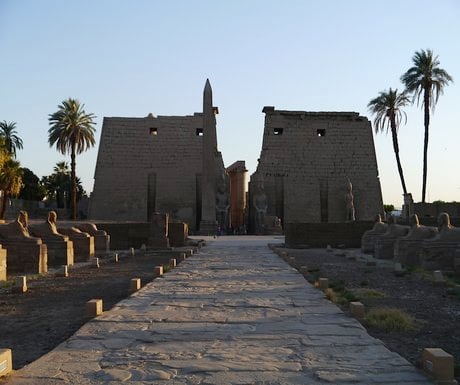 Next, hop over to the Valley of the Nobles if you can handle more tombs. Instead of the usual offerings to the gods, many of these tombs tell the life story of each resident, which offers an interesting glimpse into the daily life of a rich Egyptian.
Day 3 East Bank
Take a break from the West Bank and spend a day exploring the temples of the East Bank. Karnak and Luxor temples were originally joined by a long road named Sphinx Alley which is currently under excavation you can see each end at each temple. Start off at Karnak and aim to spend 1-2 hours here. The site is huge, and there is very little shade outside of the hall of columns.
Next, hop over to the Valley of the Nobles if you can handle more tombs. Instead of the usual offerings to the gods, many of these tombs tell the life story of each resident, which offers an interesting glimpse into the daily life of a rich Egyptian.
Day 3 East Bank
Take a break from the West Bank and spend a day exploring the temples of the East Bank. Karnak and Luxor temples were originally joined by a long road named Sphinx Alley which is currently under excavation you can see each end at each temple. Start off at Karnak and aim to spend 1-2 hours here. The site is huge, and there is very little shade outside of the hall of columns.
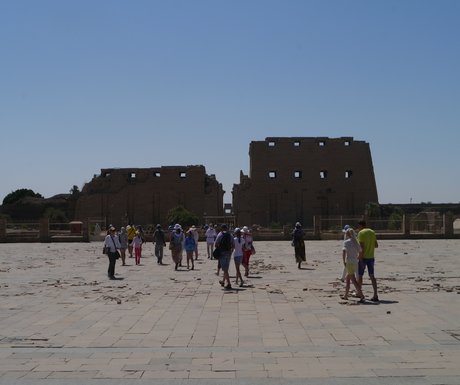 Head to Luxor museum, which is small by city standards but a delight none the less. This is the place to see the spoils of Howard Carters excavation, including Tutankhamuns bed and chariot. There are also two further mummies here, Ahmose I and Ramesses I.
Take a break before venturing to Luxor museum as the sun sets. The lights are quite spectacular and offer wonderful photo opportunities. This temple is much smaller than Karnak, but far better preserved. Tip: head to the back of the temple. It has a great example of Roman art covering Egyptian reliefs!
Day 4 Mortuary Temples
Another day at the West Bank, but this time above ground. Stop off at the Colossi of Memnon and try to spot which statue was rebuilt by the Greeks. Hint its not as impressive. These statues were not built for Trojan hero Memnon, but the whistling heard through the cracks was believed to be his spirit.
Visit Medinet Habu, the impressive mortuary temple of Ramesses III and take a look at where Coptic Christians destroyed Egyptain reliefs. Then, head over to the incredible Deir-el-Bahari, or Hatshepsuts temple, built directly opposite Karnak Temple by the worlds first famous female leader. Many of her carvings have been destroyed by her stepson, but the scale of the building is nothing short of incredible.
Head to Luxor museum, which is small by city standards but a delight none the less. This is the place to see the spoils of Howard Carters excavation, including Tutankhamuns bed and chariot. There are also two further mummies here, Ahmose I and Ramesses I.
Take a break before venturing to Luxor museum as the sun sets. The lights are quite spectacular and offer wonderful photo opportunities. This temple is much smaller than Karnak, but far better preserved. Tip: head to the back of the temple. It has a great example of Roman art covering Egyptian reliefs!
Day 4 Mortuary Temples
Another day at the West Bank, but this time above ground. Stop off at the Colossi of Memnon and try to spot which statue was rebuilt by the Greeks. Hint its not as impressive. These statues were not built for Trojan hero Memnon, but the whistling heard through the cracks was believed to be his spirit.
Visit Medinet Habu, the impressive mortuary temple of Ramesses III and take a look at where Coptic Christians destroyed Egyptain reliefs. Then, head over to the incredible Deir-el-Bahari, or Hatshepsuts temple, built directly opposite Karnak Temple by the worlds first famous female leader. Many of her carvings have been destroyed by her stepson, but the scale of the building is nothing short of incredible.
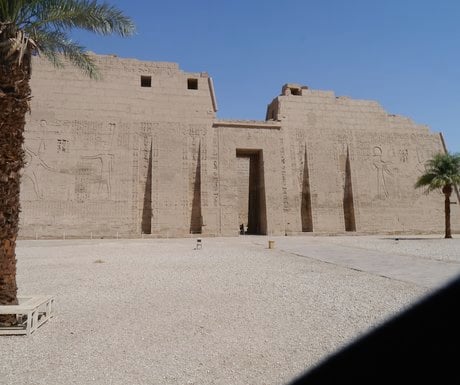
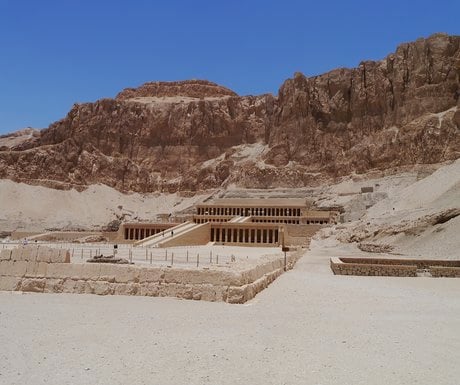 Finally, spend a couple of hours at Deir-el-Medina where the local workers made their homes. Here the artisans and builders lived, loved, and died, and to see this in comparison to the grandeur of the temples is quite moving.
Day 5 The finishing touches
After seeing so many sites and sights, bring yourself back to the present. Book a hot air balloon ride over Luxor to see all of these ancient complexes in context. Hit land and head to the shops either one of the many souks in the town for some serious haggling, or the Fair Trade Centre based opposite Luxor Temple for some locally made souvenirs. Spend the rest of your time relaxing and enjoying the Nile its beautiful place to watch the birds and boats go by. Sit and sip a hibiscus tea, or order a plate of meze, before treating those tired toes to a foot massage. Youve earned it!
Finally, spend a couple of hours at Deir-el-Medina where the local workers made their homes. Here the artisans and builders lived, loved, and died, and to see this in comparison to the grandeur of the temples is quite moving.
Day 5 The finishing touches
After seeing so many sites and sights, bring yourself back to the present. Book a hot air balloon ride over Luxor to see all of these ancient complexes in context. Hit land and head to the shops either one of the many souks in the town for some serious haggling, or the Fair Trade Centre based opposite Luxor Temple for some locally made souvenirs. Spend the rest of your time relaxing and enjoying the Nile its beautiful place to watch the birds and boats go by. Sit and sip a hibiscus tea, or order a plate of meze, before treating those tired toes to a foot massage. Youve earned it!Did you enjoy this article?
Receive similar content direct to your inbox.


This is a great travel article, but while Luxor is fabulously historic, there is much more to explore than temples and tombs.
Nice trip! Unfortunately we are quite afraid to go there, country is more than unstable.. Armed guards in all resorts.. Should be a bit disturbing I guess.
The tombs of the Nobles were better preserved & had great art since these artisans worked for the Pharohs. When we visited in late August there were only 3 tombs to visit. Perhaps because tourism is low- we loved having no crowds! As for safety, we felt very comfortable and the comment after all most international airports have armed soldiers!
Me and my wife have been thinking to travel Egypt to pyramids, but actually we are still not sure if it will be safe to go there now… After the revolution, i think that the country is no more safe now?